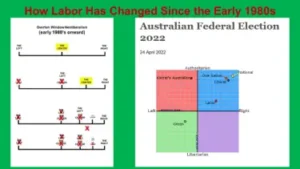
Description
Explore the impact in Australia of neoliberalism in politics on the political landscape and the merging of major parties. Learn how diversity in politics can bring change.
Introduction: The Impact of Neoliberalism in Politics on Australian Political Parties
In Australia, the political narrative has taken a significant turn as both the Labor Party and the Liberal National Party increasingly embrace neoliberal ideologies, focusing on market-led and privatisation-driven policies. This convergence poses essential questions about the effectiveness of a two-party system where both parties advocate similar economic principles, potentially overlooking broader societal and environmental needs.
Understanding Neoliberalism in Australian Politics
Adoption of Neoliberal Policies by Major Parties

Over the last few decades, Australia’s major political parties have shifted towards policies that strongly favour economic liberalism. This includes extensive privatization of public assets, deregulation of industries, reduction in public spending, and a focus on free-market mechanisms to address national economic issues. This alignment with neoliberal principles has been influenced by global economic pressures, the increasing power of multinational corporations, and the perceived need to remain competitive in a globalized economy.
Factors Influencing Neoliberal Adoption
The adoption of neoliberalism by these parties is driven by several factors:
– Globalization: As global markets become more integrated, there is a push towards adopting economic policies that favour an open economy, competitive tax regimes, and reduced trade barriers.
– Economic Crises: Responses to financial crises often involve austerity measures and restructuring economies based on neoliberal advice provided by international organizations like the RBA, IMF and the World Bank.
– Political Strategy: Neoliberal policies are often seen as pro-business and supporting them can attract campaign donations and support from powerful economic entities.
Impact on Society and Environment
Consequences for Social Equity
The shift towards neoliberalism has seen a reduction in the role of the state in welfare and social services, leading to increased inequality and reduced access to essential services for the poorer segments of society. Public assets and services have been privatized, making them less accessible to those who cannot afford them, and widening the gap between the rich and the poor.
Environmental Concerns
Environmental policies have also been affected, with economic growth often prioritized over sustainable practices. This has led to decisions that favour exploitation of natural resources and reduced investment in renewable energy sources. The deregulation of environmental protections has made it easier for businesses to bypass sustainability in the pursuit of profit.
Political Homogeneity and Its Implications
Voter Perception of Political Choices
The ideological convergence of the major parties on neoliberal lines has blurred the distinctions between them, leading to voter disenchantment. Many citizens feel that regardless of which party they vote for, the outcome will favour market mechanisms over social or environmental considerations.
Challenges to Democratic Engagement
This perceived lack of choice can lead to lower voter engagement and turnout, weakening the democratic process and potentially leading to governance that does not fully represent the electorate’s preferences.
Breaking the Two-Party System
Advantages of a Multi-Party System
Expanding beyond a two-party system could introduce new ideas and approaches to governance, including those that prioritize social welfare, environmental sustainability, and economic systems that do not solely rely on neoliberal frameworks.
Strategies for Encouraging Political Diversity
Encouraging a multi-party system involves several strategic changes:
– Electoral Reforms: Adopting proportional representation to give smaller parties a better chance at representation.
– Public Funding of Campaigns: Reducing the influence of corporate donations in politics by providing public funding for campaigns.
– Civic Education: Enhancing the public’s understanding of political issues and the impact of their vote through comprehensive civic education programs.
Conclusion: Towards a More Diverse Political Landscape
The growing homogeneity in Australian politics calls for a re-evaluation of our political and economic systems. Encouraging diversity in political representation can lead to more robust discussions and policies that reflect the complex needs of Australia’s society and environment.
Question for Readers
How can Australians foster a more diverse and representative political landscape to address social and environmental challenges effectively?
Call to Action
Take part in the political process, support diverse voices and policies, and engage in community discussions to ensure a vibrant and representative democracy.
Share This Article
Please share this article with your contacts and on social media to encourage a more informed and engaged electorate in Australia.
References:
How Labour made neoliberalism: https://opus.lib.uts.edu.au/rest/bitstreams/7face9ba-c115-49db-a27c-df77755a1399/retrieve
Reviewing the relationship between neoliberal societies and nature: https://www.ncbi.nlm.nih.gov/pmc/articles/PMC7613825/
How to fix democracy: Move beyond the two-party system, experts say: https://www.washingtonpost.com/business/2021/03/01/break-up-two-party-system/
Is this the end of the two-party system in Australia?: https://theconversation.com/is-this-the-end-of-the-two-party-system-in-australia-the-greens-teals-and-others-shock-the-major-parties-182672
Australian Labor led centre-left parties into neoliberalism. Can they lead it out?: https://www.theguardian.com/commentisfree/2017/apr/06/australian-labor-led-centre-left-parties-into-neoliberalism-can-they-lead-it-out
Neoliberalism has coned us into fighting climate change as individuals: https://www.theguardian.com/environment/true-north/2017/jul/17/neoliberalism-has-conned-us-into-fighting-climate-change-as-individuals
Two-party system: https://en.wikipedia.org/wiki/Two-party_system
